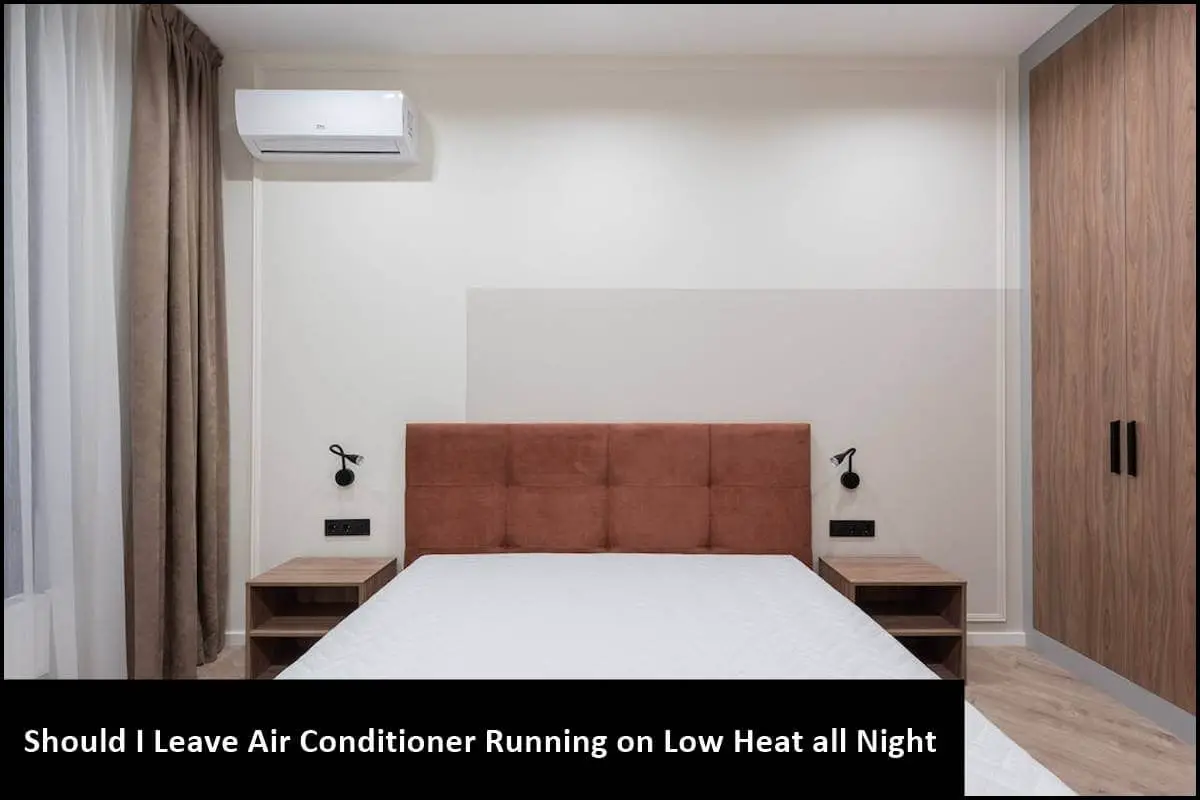Imagine this scenario: it’s a chilly night, and you’re snuggled up in bed, enjoying the warmth and comfort of your cozy blanket. As you drift off to sleep, you wonder if it’s safe to leave your air conditioner running on low heat all night. Will it save energy? Will it maintain a comfortable temperature? These are valid questions, and in this article, we’ll explore the pros and cons of leaving your air conditioner on low heat overnight.
Pros and cons of leaving the air conditioner running on low heat all night
When it comes to leaving your air conditioner running on low heat all night, there are both advantages and disadvantages to consider. Let’s start with the pros.
Pros
- Energy efficiency: Many people believe that leaving their air conditioner running all night is a waste of energy and money. However, there are certain situations where it may be beneficial. For instance, if the temperature outside drops significantly during the night, the low heat setting can help maintain a comfortable temperature indoors without using excessive energy. This can be particularly useful in regions with colder climates or during the winter season.
- Comfortable temperature: By leaving your air conditioner on low heat all night, you can ensure a consistent and comfortable temperature in your home. This can be especially beneficial for individuals who are sensitive to temperature changes or prefer a specific level of warmth while sleeping. When the air conditioner is set to a low heat setting, it can provide a gentle and consistent heat that keeps you warm throughout the night.
- Humidity control: Air conditioners not only regulate temperature but also control humidity levels. By leaving your air conditioner running on low heat all night, you can help maintain an optimal level of humidity in your home. This can be particularly advantageous in areas with high humidity, as it can prevent the growth of mold and mildew, which thrive in damp conditions.
While there are certainly advantages to leaving your air conditioner running on low heat all night, it’s important to consider the potential drawbacks as well.
Cons
- Higher energy consumption: Leaving your air conditioner running all night might lead to a higher energy bill. Even on the low heat setting, the air conditioner is still consuming electricity to maintain the desired temperature. This continuous usage can significantly impact your energy consumption, especially if you live in a region with high electricity rates. It’s essential to weigh the potential energy savings against the increased cost of running the air conditioner all night.
- Strain on the unit: Continuous usage of your air conditioner can put unnecessary strain on the unit. This can lead to increased wear and tear, reducing the lifespan of the appliance and potentially resulting in costly repairs or replacements. Additionally, running the air conditioner all night without giving it time to rest can increase the risk of malfunctions or breakdowns. It’s important to consider the long-term impact on the durability and performance of your air conditioning unit.
- Impact on air quality: Another potential concern of leaving your air conditioner running on low heat all night is the impact on air quality. When the air conditioner is constantly running, it may not have enough time to filter and circulate the air properly. This can lead to a buildup of allergens, dust, and other pollutants in your home. Poor air quality can negatively affect your respiratory health, especially for individuals with allergies or asthma. It’s crucial to ensure proper ventilation and regular maintenance of your air conditioning system to mitigate these risks.
Considering these pros and cons can help you make an informed decision about whether to leave your air conditioner running on low heat all night. However, it’s essential to take into account other factors as well, such as your specific climate, insulation, and personal preferences.
Also Read:
Can You Lay A Portable AC On It’s Side?
Energy efficiency considerations
Energy efficiency is a crucial factor to consider when deciding whether to leave your air conditioner running on low heat all night. While the low heat setting can help maintain a comfortable temperature without using excessive energy, it’s important to assess the overall impact on your energy consumption.
One way to gauge the energy efficiency of your air conditioner is by considering its SEER (Seasonal Energy Efficiency Ratio) rating. The higher the SEER rating, the more efficient the unit is in terms of energy consumption. If your air conditioner has a high SEER rating, leaving it on low heat all night may be more energy-efficient compared to older or less efficient models.
However, it’s important to note that even with a high SEER rating, leaving your air conditioner running all night will still consume electricity. If you’re concerned about energy usage, consider alternative ways to maintain a comfortable temperature, such as using blankets or wearing warmer sleepwear. Additionally, optimizing your home’s insulation and sealing any drafts can help reduce heat loss and minimize the need for continuous air conditioning usage.
Impact on air quality and indoor environment
Leaving your air conditioner running on low heat all night can have implications for the air quality and overall indoor environment of your home. When the air conditioner operates continuously, it may not have sufficient time to filter and circulate the air properly, potentially leading to a decline in air quality.
To mitigate this risk, it’s essential to ensure proper ventilation in your home. Opening windows periodically during the day can help bring in fresh air and improve air circulation. Additionally, regularly cleaning or replacing air filters is crucial to maintain good indoor air quality. Filters can trap dust, allergens, and other pollutants, preventing them from circulating in your home and potentially causing respiratory issues.
Monitoring humidity levels is another important consideration. While air conditioners can help control humidity, excessive moisture can still accumulate if the unit is running continuously. High humidity can create a favorable environment for mold and mildew growth, which can contribute to respiratory problems and damage to your home. Using a dehumidifier alongside your air conditioner can help maintain optimal humidity levels.
Impact on sleep quality and comfort
For many people, a comfortable sleeping environment is essential for a good night’s rest. Leaving your air conditioner running on low heat all night can help create a consistent and comfortable temperature that promotes better sleep quality.
When the air conditioner is set to a low heat setting, it provides a gentle and continuous heat that can help regulate your body temperature throughout the night. This can be particularly beneficial for individuals who are sensitive to temperature changes or experience discomfort in colder environments.
However, it’s important to find the right balance between temperature and noise levels. Some air conditioning units can be noisy, which can disrupt sleep and hinder the overall sleep quality. If noise is a concern, consider using a quieter model or utilizing features such as sleep mode, which reduces noise levels during the night.
Additionally, personal preferences play a crucial role in determining sleep comfort. While some individuals may find the low heat setting ideal for a cozy sleep environment, others may prefer cooler temperatures for better sleep. Experimenting with different settings and finding what works best for you is key to optimizing sleep quality and comfort.
Another useful read:
How to Repair Split AC – Everything You Need to Know
Tips for optimizing air conditioning usage at night
If you decide to leave your air conditioner running on low heat all night, there are several tips you can follow to optimize its usage and minimize potential drawbacks.
- Set appropriate temperature: Experiment with different temperature settings to find the ideal balance between comfort and energy efficiency. Setting the temperature slightly lower can help save energy while still maintaining a comfortable sleeping environment.
- Use timers or programmable thermostats: Utilize timers or programmable thermostats to automate the operation of your air conditioner. This allows you to set specific time intervals for the unit to run and adjust the temperature according to your sleep schedule. By programming the air conditioner to turn off or reduce its operation during periods of lower occupancy, you can save energy without compromising comfort.
- Regular maintenance: Ensure regular maintenance of your air conditioning system to keep it running efficiently. Clean or replace air filters as recommended by the manufacturer to maintain good air quality and prevent strain on the unit. Additionally, schedule professional inspections and tune-ups to identify any potential issues and ensure optimal performance.
- Consider zoning or individual room control: If you only require heating in specific areas of your home during the night, consider utilizing zoning systems or individual room control. This allows you to direct heat only to the areas that need it, reducing energy consumption and increasing comfort.
- Supplement with alternative heating methods: Instead of relying solely on your air conditioner for heating, consider supplemental heating methods such as electric blankets, space heaters, or radiant heaters. These can provide targeted warmth in specific areas while allowing you to reduce the reliance on the air conditioner.
By implementing these tips, you can optimize the usage of your air conditioner at night, ensuring both comfort and energy efficiency.
Alternatives to leaving the air conditioner running all night
Leaving the air conditioner running on low heat all night is not the only option for maintaining a comfortable sleeping environment. There are alternative methods that can help regulate temperature without continuous air conditioning usage.
- Use blankets and layers: Opt for warmer blankets and layering your bedding to create a cozy sleep environment. By using thicker blankets or adding an extra layer, you can provide insulation and warmth without relying solely on the air conditioner.
- Wear warmer sleepwear: Choosing sleepwear that provides warmth can help regulate your body temperature and reduce the need for continuous heating. Thermal or flannel pajamas, socks, or even a warm robe can help keep you comfortable during colder nights.
- Seal drafts and insulate: Proper insulation and sealing drafts can significantly reduce heat loss and maintain a comfortable temperature in your home. Check for any gaps or leaks around windows, doors, and vents, and seal them to prevent cold air from entering and warm air from escaping.
- Localized heating: If you only require heating in specific areas of your home, consider using localized heating methods such as space heaters or radiant heaters. These can provide targeted warmth in the areas you frequent the most, reducing the need for continuous air conditioning usage throughout the entire house.
- Utilize smart home technology: Smart thermostats and home automation systems can help optimize heating and cooling settings based on occupancy and time of day. These devices can adjust the temperature according to your sleep schedule, ensuring comfort while minimizing energy consumption.
Exploring these alternatives can provide you with more flexibility in maintaining a comfortable sleep environment while potentially reducing energy consumption and the strain on your air conditioning unit.
Common misconceptions about air conditioning usage at night
There are several common misconceptions surrounding air conditioning usage at night. Let’s debunk some of these myths to provide a clearer understanding.
Myth 1: Leaving the air conditioner running all night saves energy: While it’s true that the low heat setting can save energy compared to higher heat settings, leaving the air conditioner running all night still consumes electricity. It’s important to assess the overall energy consumption and weigh it against the benefits and potential drawbacks.
Myth 2: Air conditioners purify the air: Air conditioners are not designed to purify the air. While they can help filter out some particles and allergens, they do not have the same level of air purification capabilities as dedicated air purifiers. To improve indoor air quality, consider using an air purifier alongside your air conditioner.
Myth 3: Continuous air conditioning usage is necessary for comfort: Continuous air conditioning usage is not always necessary for comfort. By implementing alternative methods such as insulation, blankets, or localized heating, you can achieve a comfortable sleep environment without relying solely on the air conditioner.
Myth 4: The air conditioner should always be set to the same temperature at night: Different individuals have different comfort preferences during sleep. Experimenting with different temperature settings and finding what works best for you is crucial. Some people may prefer slightly cooler temperatures, while others may find a slightly warmer setting more comfortable.
By dispelling these misconceptions, you can make more informed decisions regarding the usage of your air conditioner at night.
Also read:
Why is My AC Leaking Water Inside?
Expert opinions and recommendations
Experts have varying opinions when it comes to leaving your air conditioner running on low heat all night. While some experts believe it can be an energy-efficient way to maintain a comfortable temperature, others caution against continuous usage. Here are some expert opinions and recommendations:
- Energy Star: According to Energy Star, a program run by the U.S. Environmental Protection Agency, setting your thermostat to a lower temperature during colder months can help save energy and reduce heating costs. However, they recommend lowering the temperature only when you are awake and at home, and increasing it when you are sleeping or away.
- Department of Energy (DOE): The DOE suggests adjusting your thermostat to a lower temperature at night and when you are away from home to save energy. They recommend setting the thermostat to 68°F (20°C) during the winter for optimal energy efficiency and comfort.
- The American Society of Heating, Refrigerating and Air-Conditioning Engineers (ASHRAE): ASHRAE recommends setting the thermostat to a slightly cooler temperature during sleep to promote better sleep quality. However, they emphasize the importance of finding a temperature that is comfortable for you and meets your sleep needs.
- HVAC professionals: HVAC professionals often recommend using programmable thermostats to automate temperature adjustments based on occupancy and time of day. This allows for energy savings during periods of lower occupancy, such as at night or when you are away from home.
It’s important to consider these expert opinions and recommendations while also taking into account your specific circumstances, climate, and personal preferences.
Final thoughts
Deciding whether to leave your air conditioner running on low heat all night is a personal choice that depends on various factors. While it can help maintain a comfortable temperature and improve sleep quality, it’s important to consider the potential drawbacks such as increased energy consumption, strain on the unit, and impact on air quality.
To make an informed decision, assess your specific climate, insulation, and personal preferences. Experiment with different temperature settings and utilize alternative methods such as blankets, localized heating, and smart home technology to optimize comfort and energy efficiency.
Remember to regularly maintain your air conditioning system, clean or replace air filters, and ensure proper ventilation to mitigate potential risks and maintain good indoor air quality.
Ultimately, finding the right balance between comfort and energy efficiency is key. By considering all the factors discussed in this article, you can make a decision that suits your needs and helps create an optimal sleep environment.

Hello, I’m James, the founder of FixitAllSecure.com. With over 10 years of experience in appliance repair, I’ve made it my mission to assist homeowners like you in resolving appliance issues, saving you precious time and money. From practical repair guides to prevention tips, I’m here to ensure your appliances run smoothly and your household stays stress-free.


